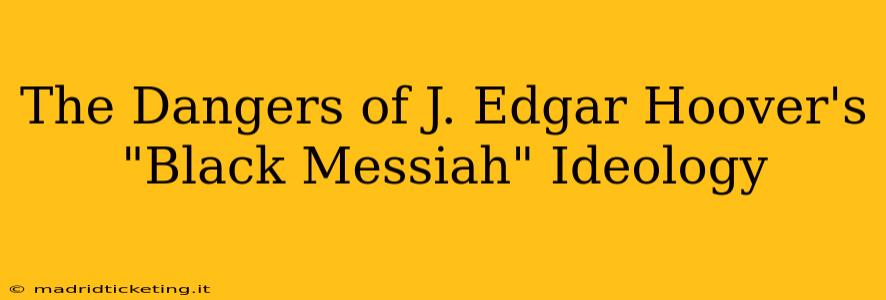J. Edgar Hoover, the long-serving Director of the Federal Bureau of Investigation (FBI), wielded immense power and influence throughout much of the 20th century. His legacy, however, is deeply tarnished by his relentless pursuit of political opponents and his cultivation of a climate of fear and suspicion. One particularly insidious aspect of his leadership was his exploitation of the concept of a "Black Messiah," a racially charged ideology that fueled discriminatory practices and undermined civil rights progress. This essay will explore the dangerous implications of Hoover's "Black Messiah" theory and its lasting impact on American society.
What was Hoover's "Black Messiah" Theory?
Hoover's "Black Messiah" theory wasn't a formally articulated doctrine but rather a recurring theme in his surveillance and investigative practices. He feared the rise of a charismatic Black leader who could unite the African American community and inspire widespread social unrest, potentially even leading to a violent revolution. This fear was rooted in his deeply ingrained racism and his belief in maintaining the existing social hierarchy. He saw any significant Black political or social movement as a potential threat to national security. This fear manifested in his relentless surveillance of prominent Black activists, leaders, and organizations, including Martin Luther King Jr. and the NAACP.
How did Hoover use this ideology to justify his actions?
Hoover used the specter of a "Black Messiah" to justify his extensive surveillance programs and his attempts to discredit and undermine the Civil Rights Movement. By portraying Black leaders as potential instigators of violence and communist sympathizers, he attempted to legitimize his actions in the eyes of a white, often fearful, public. This allowed him to secure funding, expand the FBI's powers, and maintain his own grip on authority. The COINTELPRO program, a series of covert, often illegal, FBI operations targeting domestic political organizations, stands as a stark example of this abuse of power. COINTELPRO systematically infiltrated, disrupted, and discredited numerous Black activist groups, often through harassment, misinformation, and even violence.
What were the consequences of Hoover's actions?
The consequences of Hoover's "Black Messiah" ideology were far-reaching and devastating. It exacerbated racial tensions, hindered the progress of the Civil Rights Movement, and violated the fundamental rights of countless individuals. The FBI's surveillance and disruptive tactics contributed to a climate of fear and mistrust within the Black community. It also led to the unjust targeting and persecution of innocent people based solely on their race or their association with civil rights organizations. The legacy of these actions continues to impact race relations and the relationship between marginalized communities and law enforcement.
Was Hoover's fear of a Black Messiah justified?
No. While Hoover's fear of social unrest was certainly present in the volatile social climate of the mid-20th century, his response was disproportionate and ultimately counterproductive. The threat he perceived was largely manufactured through his own prejudice and his deliberate misrepresentation of the Civil Rights Movement. Focusing on the threat of a single "messiah" ignored the complex realities of the movement and the diverse range of activism within it. Furthermore, the actions Hoover took to combat this perceived threat ultimately inflamed tensions and hampered progress toward racial equality.
Did Hoover's actions violate civil rights?
Absolutely. Hoover's actions were a clear violation of the civil rights of countless individuals. The surveillance, infiltration, and harassment carried out under his direction constituted a blatant disregard for the principles of due process and freedom of speech and association. The COINTELPRO program, in particular, serves as a chilling example of the abuse of power and the lengths to which Hoover was willing to go to suppress dissent and maintain his own authority.
How did Hoover's actions shape the relationship between the FBI and the Black community?
Hoover's legacy casts a long shadow over the relationship between the FBI and the Black community. The deep mistrust fostered by his surveillance programs and the use of intimidation tactics continue to affect the ability of law enforcement to build trust and effectively police in Black communities. Efforts to address the legacy of COINTELPRO and to build bridges of understanding remain ongoing and crucial to fostering a more just and equitable society.
In conclusion, J. Edgar Hoover's "Black Messiah" ideology was a dangerous and destructive force that fueled discriminatory practices, violated civil rights, and deeply damaged the relationship between law enforcement and the Black community. Understanding this dark chapter in American history is crucial to confronting persistent racial injustices and building a more just future. The legacy of Hoover's actions serves as a stark reminder of the importance of accountability, transparency, and the protection of civil liberties in the face of perceived threats.

